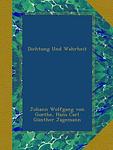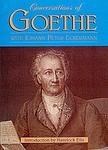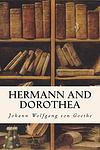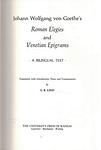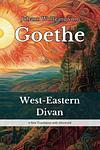Johann Wolfgang von Goethe
Johann Wolfgang von Goethe was a German writer, poet, playwright, and statesman. Born on August 28, 1749, in Frankfurt, he is considered one of the greatest literary figures of the Western world. Goethe's works span the fields of poetry, drama, literature, theology, humanism, science, and painting. He is best known for his two-part poetic drama 'Faust,' which he started around the age of 23 and completed shortly before his death in 1832. Goethe's body of work includes epic and lyric poetry written in a variety of metres and styles; prose and verse dramas; memoirs; an autobiography; literary and aesthetic criticism; treatises on botany, anatomy, and color; and four novels. In addition, numerous literary and scientific fragments, more than 10,000 letters, and nearly 3,000 drawings by him exist. His influence on German philosophy is virtually immeasurable, having major impact on the development of German idealism. He died on March 22, 1832, in Weimar, Germany.
Books
This list of books are ONLY the books that have been ranked on the lists that are aggregated on this site. This is not a comprehensive list of all books by this author.
-
1. Faust
The book is a tragic play in two parts that tells the story of a scholarly man named Faust, who becomes dissatisfied with his life and makes a pact with the devil, Mephistopheles. In exchange for unlimited knowledge and worldly pleasures, Faust agrees to give his soul to Mephistopheles after death. The narrative explores themes of ambition, despair, love, and redemption, ultimately leading to Faust's salvation.
-
2. The Sorrows of Young Werther
This classic novel follows the emotional journey of a young artist named Werther, who falls deeply in love with a beautiful woman named Lotte, only to discover that she is already engaged to another man. His unrequited love and deep despair eventually lead him to take his own life. The story, told through letters written by Werther, explores themes of love, loss, and the tragic consequences of emotional turmoil.
-
3. Wilhelm Meister's Apprenticeship
"Wilhelm Meister's Apprenticeship" is a classic coming-of-age story that follows the protagonist, Wilhelm, through his journey of self-discovery. Caught between his bourgeois background and his aspirations to become an actor, Wilhelm embarks on an odyssey that introduces him to a variety of characters and experiences. The novel explores themes of love, loss, and the pursuit of artistic excellence, while also critiquing the social norms and expectations of the time.
-
4. Elective Affinities
This novel explores the romantic relationships and social dynamics of four characters: a married couple, their close friend, and a young girl who becomes part of the household. The story is a study of how people's choices, passions, and societal norms can shape their relationships, often with tragic consequences. The narrative delves into themes of marriage, love, morality, and the intersection of personal feelings with societal expectations.
-
5. Dichtung Und Wahrheit
This autobiographical work offers a rich and introspective account of the author's early life, intellectual development, and the cultural milieu of the late 18th and early 19th centuries. It delves into his formative experiences, relationships, and the evolution of his thoughts and literary career. The narrative not only provides insights into the author's personal journey but also reflects on the broader human experience, exploring themes of truth, art, and the interplay between personal reality and creative expression. Through a blend of poetic storytelling and philosophical musings, the book presents a nuanced exploration of the shaping of an individual's identity and the forces that influence the creative process.
-
6. Italian Journey
The book is a classic travel memoir that chronicles the author's journey through Italy from 1786 to 1788. During his travels, he explores the rich cultural heritage, art, and history of the country, seeking to understand the influence of classical antiquity and the Renaissance on contemporary European thought. The narrative is a blend of personal reflections, detailed descriptions of the landscapes, cities, and people he encounters, as well as musings on art and literature. The author's experiences in Italy mark a significant period of personal growth and intellectual development, profoundly impacting his subsequent literary work and contributing to the broader European cultural movement known as Weimar Classicism.
-
7. Conversations Of Goethe With Johann Peter Eckermann
This book is a compilation of detailed discussions between one of Germany's greatest literary figures and his close friend and secretary, spanning from 1823 to 1832. It offers an intimate glimpse into the mind, thoughts, and philosophies of the celebrated writer, covering a wide array of subjects including literature, art, science, and the nature of human existence. Through these conversations, readers are provided with profound insights into the intellectual landscape of early 19th-century Europe and the personal reflections of a man who shaped modern German literature. The dialogues are not only significant for their historical context but also for their enduring relevance to contemporary discussions on culture and creativity.
-
8. Egmont
"Egmont" is a tragic play set in the 16th-century Spanish-occupied Netherlands, focusing on the life of a nobleman who becomes a hero among the Dutch people for his resistance against the oppressive Spanish rule. The protagonist's political and romantic involvements lead him into conflict with the Spanish authorities, culminating in his arrest and execution. Despite his tragic end, his sacrifice becomes a symbol of national resistance and inspires a successful uprising against the foreign dominators. The play explores themes of freedom, tyranny, and the personal costs of political engagement, blending historical drama with romantic elements.
-
9. Verse Plays
The book is a collection of dramatic works written in verse by the renowned German literary figure. These plays showcase the author's versatility and mastery in blending classical and romantic elements within the theatrical form. The content ranges from explorations of mythological themes to humanistic inquiries, all unified by the author's poetic language and philosophical depth. The plays within this compilation are celebrated for their lyrical beauty and intellectual rigor, reflecting the author's profound understanding of the human condition and his ability to translate complex ideas into compelling dramatic narratives.
-
10. Hermann And Dorothea
This classic narrative poem tells the story of two young people, Hermann and Dorothea, who find love amidst the turmoil of war. Set against the backdrop of the French Revolution's impact on Germany, the poem explores themes of duty, community, and the personal transformations that arise from political upheaval. Hermann, the son of a prosperous innkeeper, initially sets out to aid refugees fleeing the conflict and encounters Dorothea, a strong and principled woman among them. Their relationship develops as they navigate the challenges of their time, ultimately leading to a union that symbolizes hope and the enduring human spirit in the face of adversity.
-
11. Poems Of Johann Wolfgang Von Goethe
This collection encapsulates the lyrical genius of one of Germany's most revered literary figures, offering a diverse selection of poetry that spans themes of love, nature, and the human condition. The poems reflect the author's profound insight into the complexities of the soul and the beauty of the world around him, showcasing his mastery of language and his ability to evoke deep emotion and contemplation. The work is a testament to the enduring power of poetic expression and the timeless relevance of the author's reflections on life and art.
-
12. Venetian Epigrams
"Venetian Epigrams" is a collection of short, incisive poems that reflect the author's observations and experiences during a stay in Venice. Written with a blend of wit, irony, and lyrical beauty, the epigrams delve into themes such as love, sexuality, art, and the nature of society. The author's sharp commentary on the Venetian way of life, as well as his personal reflections on human relationships and the pursuit of pleasure, are presented in a concise and often provocative manner, revealing the depth of his engagement with the culture and the vibrancy of the city that inspired him.
-
13. West Eastern Divan
The book in question is a collection of lyrical poems that reflects the author's fascination with Persian culture, inspired by the works of the Persian poet Hafez. It serves as a poetic dialogue that bridges Western and Eastern cultural traditions, exploring themes of love, wine, and the nuanced interplay between nature, humanity, and the divine. The work is notable for its attempt to transcend cultural barriers and promote understanding between the Occident and the Orient, showcasing the author's deep appreciation for the richness of Middle Eastern literature and philosophy.
-
14. Roman Elegies
"Roman Elegies" is a collection of twenty-four poems that celebrate the classical heritage of ancient Rome while reflecting on contemporary European society. The poems are notable for their eroticism and the personal nature of their content, as they delve into the author's own experiences and emotions during his time in Italy. Through a blend of personal reflection and homage to the ancient world, the work explores themes of love, art, and the human experience, blending the sensual with the intellectual. The elegies are a testament to the author's passion for classical culture and his mastery of poetic form, as well as his ability to infuse his verse with both the depth of his scholarly interests and the intensity of his personal feelings.




